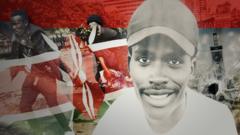The BBC's Africa Eye team has identified members of Kenya's security forces responsible for shooting unarmed anti-tax protesters during the June 2024 demonstrations outside parliament in Nairobi. The investigation, which scrutinized over 5,000 images, concluded that those killed were not posing a threat during the protests, which were aimed at opposing a controversial finance bill.
Under Kenya's constitution, the right to peaceful protest is protected, and the killings sparked nationwide outrage. Even though a parliamentary committee instructed the Independent Policing Oversight Authority (IPOA) to examine the deaths, no report has been released, and accountability remains absent.
Protests commenced on June 25, with a substantial turnout of primarily young demonstrators, dubbed Gen Z protesters, mobilized via social media. Human rights activist Boniface Mwangi characterized the gathering as a festive "carnival" atmosphere, highlighting the people's efforts against ruling class policies, especially in light of prior successful protests that led to the removal of certain tax hikes.
However, as protestors gathered near parliament, tensions escalated. Initially met with roadblocks and water cannons, the crowd swelled to over 100,000. As opposition MPs discussed contentious finance reforms, the situation boiled over, leading to a confrontation between demonstrators and security forces. Eyewitness accounts detailed scenes of chaos punctuated by gunfire, with protesters alleging they were fired upon without provocation.
Videos surfaced showing plain-clothes officers inciting violence, and the BBC identified a specific officer—named John Kaboi—who urged others to "kill" while taking shots at the crowd, resulting in the deaths of David Chege and Ericsson Mutisya. Investigations linked them to earlier unarmed casualties, exemplifying the tragic outcome of these governmental actions against peaceful demonstrators.
Despite multiple sources confirming these actions, Kenya's police service deflected responsibility, citing the IPOA's role in misconduct investigations. The shooter’s identity and motivations open a broader dialogue about governmental violence against its citizens in a nation struggling with economic challenges and public dissent.
The aftermath of this violent day saw further outbreaks of unrest. While the Finance Bill was eventually retracted following public pressure and government acknowledgment of protester grievances, the loss of lives and lack of accountability sparked a critical need for reform within Kenya’s security framework.
As dark memories of fatal enforcement practices linger, Kenyans continue to call for justice, waiting to see if law enforcement will ever be held accountable for such tragic deeds.



















